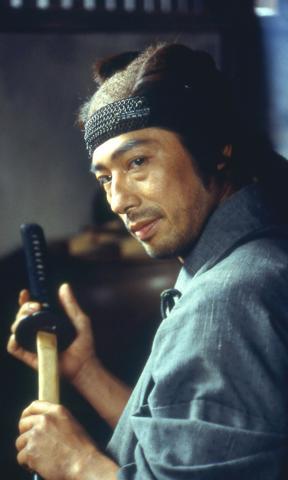The title of the director Yoji Yamada's minor character drama, the initially slow-going Twilight Samurai, may evoke an image of duels between volatile warriors as the setting sun silhouettes their early-evening battles. But the film's name actually refers to a taciturn, devoted -- and impoverished -- widower in the Edo period, Seibei Iguchi (Hiroyuki Sanada), who dashes home at dusk to spend time with his young daughters and ailing mother.
Yet the martial associations hinted at in the title eventually materialize: a tense and compact sword battle, tinted with anxiety and regret, gives the last act a sizzling muscularity.
In his ratty and worn kimono, the quiet, sensitive Seibei smells as if he's been fighting for days; his lack of personal hygiene, or interest in night life, makes him the object of scorn and ridicule from his bookkeeping co-workers. Behind his back they mock their homebound colleague as Twilight Seibei.

PHOTO COURTESY OF SWALLOW WINGS FILMS
Yamada's devotion to somber, everyday detail will definitely test the patience of many. He starts Samurai with the arresting and bleak images of a winter funeral -- the funereal whites worn in the procession blending in with the cold, pale vistas as the body of Seibei's wife is carried to its final resting place. Seibei's younger daughter, Ito (Erina Hashiguchi), supplies a voice-over, revealing that her mother died when she was 5.
This grim, blunt opening has a stoic, baroque power, a quality that defines most of this 2004 Oscar nominee for best foreign-language film.
The word samurai in the title seems to mock audience expectations as well as Seibei's banal existence. Most of his working time is spent keeping an inventory of provisions and offending visiting bigwigs with his malodorous presence. His remote gentility thaws when he is home with his children, Kayano (Miki Ito), and Ito, who is the conscience of the film and dotes on her father. (When the camera catches her sleeping, it seems as if she rests with one eye partly open to keep watch over her hard-working father.)
And a caring, slightly puzzled expression covers Seibei's face as his senile mother (Reiko Kusamura) constantly asks him which family he is from. Sanada is expert at alternating Seibei's acute awareness of his surroundings with a bland guardedness. The film itself often assumes such a stance; despite the handsome and thoughtfully lighted cinematography by Mutsuo Naganuma, the closed wariness that Seibei exercises reflects the way the director handles the film, allowing only Seibei's adoration of his girls to provide some warmth.
Seibei is berated by a cruel uncle (Tetsuro Tamba) who demands to know why his nephew has not found someone -- anyone -- to remarry, so that order can be restored to the Iguchi household. This cantankerous, blustery older man also ties his sister -- Seibei's mother -- to a post. Seibei has to maintain some calm in the house, while conspiratorially joking with his daughters about his highly strung uncle.
An old girlfriend, the sweet Tomoe (the delicate and precise Rie Miyazawa), re-enters Seibei's life, bringing a complicated domestic history with her; her presence in the film allows Yamada to create a meticulous tableau wracked with internal and external pressures.
At about this time Seibei demonstrates his startling reflexes and martial skills in a scene that is staged with hilarious deftness. Seibei's co-workers gulp as they call him Twilight from then on. (Sanada's physical effortlessness has been a mainstay in numerous films, including a turn in The Last Samurai.)
Yamada is confident that by taking his time and relishing the leathery arrogance that is the perquisite of a director in his 70's, his audience will follow his whims. The loving, nervous formality of the courtship between Seibei and Tomoe occupies his attention as much as the other elements: he wants to give each tick of the story as much time as possible. In some ways this makes Samurai feel like the kind of distended drama that is often rewarded with a foreign-film Oscar nomination. But Yamada counts on his command to make audiences stick around for the action that constitutes the last section.
This film also buzzes with sorrow: when the fights finally arrive they are informed by an adult sense of doom and misery. What Yamada does by lingering until he has to force Seibei into a physical challenge is to develop a melodramatic aspect for the scenario. It is not enough for his protagonist to defend himself; he has to live with all the consequences.

“Why does Taiwan identity decline?”a group of researchers lead by University of Nevada political scientist Austin Wang (王宏恩) asked in a recent paper. After all, it is not difficult to explain the rise in Taiwanese identity after the early 1990s. But no model predicted its decline during the 2016-2018 period, they say. After testing various alternative explanations, Wang et al argue that the fall-off in Taiwanese identity during that period is related to voter hedging based on the performance of the Democratic Progressive Party (DPP). Since the DPP is perceived as the guardian of Taiwan identity, when it performs well,

The Taiwan People’s Party (TPP) on May 18 held a rally in Taichung to mark the anniversary of President William Lai’s (賴清德) inauguration on May 20. The title of the rally could be loosely translated to “May 18 recall fraudulent goods” (518退貨ㄌㄨㄚˋ!). Unlike in English, where the terms are the same, “recall” (退貨) in this context refers to product recalls due to damaged, defective or fraudulent merchandise, not the political recalls (罷免) currently dominating the headlines. I attended the rally to determine if the impression was correct that the TPP under party Chairman Huang Kuo-Chang (黃國昌) had little of a

At Computex 2025, Nvidia CEO Jensen Huang (黃仁勳) urged the government to subsidize AI. “All schools in Taiwan must integrate AI into their curricula,” he declared. A few months earlier, he said, “If I were a student today, I’d immediately start using tools like ChatGPT, Gemini Pro and Grok to learn, write and accelerate my thinking.” Huang sees the AI-bullet train leaving the station. And as one of its drivers, he’s worried about youth not getting on board — bad for their careers, and bad for his workforce. As a semiconductor supply-chain powerhouse and AI hub wannabe, Taiwan is seeing

Jade Mountain (玉山) — Taiwan’s highest peak — is the ultimate goal for those attempting a through-hike of the Mountains to Sea National Greenway (山海圳國家綠道), and that’s precisely where we’re headed in this final installment of a quartet of articles covering the Greenway. Picking up the trail at the Tsou tribal villages of Dabang and Tefuye, it’s worth stocking up on provisions before setting off, since — aside from the scant offerings available on the mountain’s Dongpu Lodge (東埔山莊) and Paiyun Lodge’s (排雲山莊) meal service — there’s nowhere to get food from here on out. TEFUYE HISTORIC TRAIL The journey recommences with